THE SECOND CIVIL WAR AND CIVIL WAR; AN ALARMING PAIR OF FILM REVIEWS (PLUS A BONUS REVIEW OF A MURDER AT THE END OF THE WORLD)
By Chris M. Barkley:
The Second Civil War (*** of 4 stars, HBO Films, 1997, 96 minutes) with Beau Bridges, Phil Hartman, James Earl Jones, Elizabeth Pena, Ron Perlman, James Coburn, Dan Heyada, Joanna Cassidy and Denis Leary. Written by Martyn Burke, Directed by Joe Dante. Bechdel Test: Fail.
Civil War (**** of four stars, A24, 2024, 109 minutes) with Kirsten Dunst, Wagner Moura, Cailee Spaeny, Stephen McKinley Henderson and Nick Offerman. Written and Directed by Alex Garland. Bechdel Test: Pass!
Although I saw writer-director Alex Garland’s highly anticipated dystopian thriller Civil War more than a week ago, I decided to hold off on reviewing it until this past week’s real life (and possibly dystopian) events played out in New York City, Washington D.C. and, surprisingly enough, Phoenix Arizona.
On Monday, April 21 In New York City, the 45th president of the United States entered the second week of a felony trial of submitting false financial documents to cover up hush money payments to two women in order to influence the outcome of the 2016 election.
At nearby Columbia University, students and faculty continued their clash with the school’s administrators, who are protesting the school’s investments with the state of Israel and that country’s questionable actions which are resulting in rising civilian casualties in the Gaza Strip. The highly publicized acts of harassment and arrests of protesters by the New York Police Department have inspired similar uprisings at many other universities across the country.
On Wednesday April 24, the nine Justices of the Supreme Court of the United States heard oral arguments on whether or not the previous president had an unlimited right of immunity from prosecution from any act, even illegal ones, while in office and afterwards as well.
Later that same day, a grand jury in Arizona indicted former White House aide Mark Meadows, disbarred attorney Rudi Giuilani and nine others in a scheme to send fraudulent electors to the January 6th verification of Electoral Votes.
You may be wondering what any of these events have anything to do with Alex Garland’s Civil War or why it is paired with HBO’s 1998 satire on political conflict, The Second Civil War.
And the answer is, in my humble opinion, everything.
For decades, alarmists and fringe political pundits have been predicting that the social, economic, cultural and political divisions plaguing the United States are leading up to an open and active civil conflict between citizens.
And it’s hard to deny that the seed of dissent and discontent were planted in the 1960’s when various factors, such as income inequality, the polarization of the political parties and election cycles, the wide dissemination of lies and disinformation and the rise the internet and social media began to percolate throughout every strata of life.
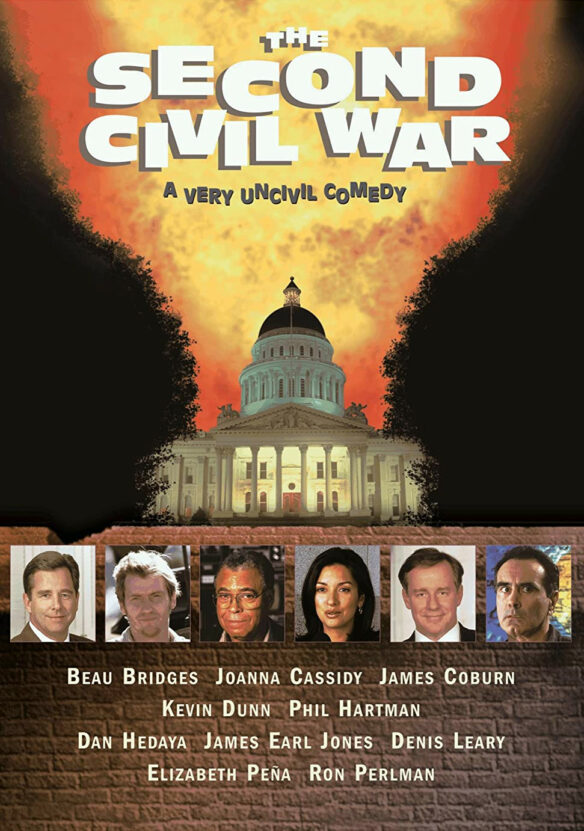
“Over the years whenever I revisit this film at festivals or retrospectives I’m always amazed how prescient it was. The issues it deals with have never dated (unfortunately). It’s usually just a matter of which ones are outstanding at the moment. And right now the TV images of Americans turning away buses full of immigrant children have their nearly exact counterpart in the movie, although there it’s the military turning “the little ragheads” around. In Europe, where it was released theatrically, TSCW has a higher profile than it has in America, as it premiered on HBO and hasn’t been revived in years. But it’s worth checking out as a movie that can inspire discussion and debate about problems that just won’t go away.”
–The Second Civil War director, Joe Dante, July 5th, 2014, Trailers From Hell.com
As I was dodging reviews of Civil War the week before, I came across a timely article from Cracked.com (“America’s Reliable Source of Snark”) about a strangely prescient film from 1998, The Second Civil War (A Very Uncivil Comedy): “The Best Movie About a Modern Civil War is a ‘90s Phil Hartman Comedy”.
Intrigued, I managed to snag a relatively inexpensive DVD online and watched it the evening before my partner Juli and I saw Civil War.
Set in an early 21st century immigrant-heavy America where the Mayor of Los Angeles speaks only in Spanish, Rhode Island is populated mostly by Chinese Americans, and Alabama has a Sikh congressman, the white governor of Idaho, Jim Farley (Beau Bridges) decides that he’s had enough. When refugee children from Pakistan are ordered to be sent there, Farley orders the National Guard to close the border, citing the move as a threat to public safety. His fervent exclamation, “We are being swamped. We are destroying our own way of life,” has been a familiar political talking point, mainly for the Republican Party, for more than two generations now.
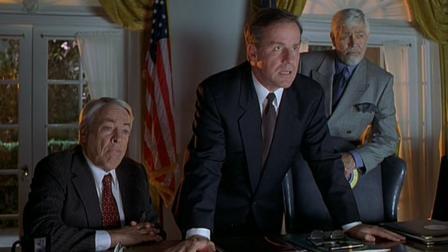
Meanwhile at NewsNet (a sly amalgamation of CNN and the then year-old Fox News), network manager Mel Burgess (a delightfully obnoxious Dan Hedaya) is frantically trying to browbeat and manipulate his reporters, staff and producers (James Earl Jones, Joanna Cassidy, Ron Perlman, Denis Leary and Dick Miller among many others) to not only get the story but scoop their rivals by any means necessary.
But, beyond the governor’s staff, the media and the public at large don’t knows that Farley is a two-faced populist who not only loves Mexican culture, he’s also is having a passionate affair with a local NewsNet reporter, Christina (Elizabeth Pena), who is ironically enough, a naturalized citizen who was born in Mexico.
If all of this weren’t bad enough, the President, played by Saturday Night Live veteran Phil Hartman (in one of his last screen roles), is an ineffectual sap who’s ignoring the advice from his cabinet and staff and instead is relying on Jack B. Buchan (a smooth and oily James Coburn) a public relations crisis manager.
When militias from other states join Idaho in opposition to the President, things gradually and eventually go off the rails in a major and tragic way.
Watching The Second Civil War was like looking into a time portal into the late 1990’s; if you look closely, you will see characters spout some very familiar talking points on immigrants and immigration, racism, blatant sexism and high handed political grandstanding.
But what makes this twenty-seven year old film highly watchable and entertaining is the sure handed direction by Joe Dante (The Howling, Gremlins, Innerspace, The ‘Burb) and the whip smart script by Canadian screenwriter Martyn Burke, who, as it happens was also an former reporter, a novelist and a documentary filmmaker.
If you want to check out this darkly funny farce, you can watch it via streaming on YouTube, Amazon Prime and Apple+.
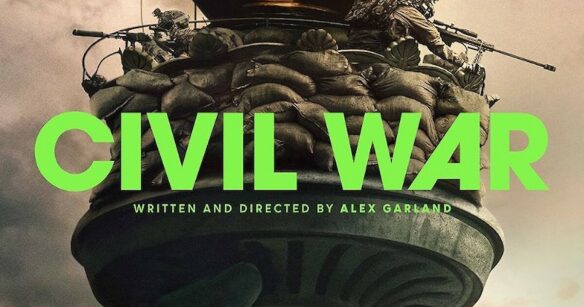
“There is something in the film which is trying to be protective of [journalists],” says Garland. His father was a longtime newspaper cartoonist, and you can sense an admiration for that old guard of foreign correspondents he grew up around in London. “I think serious journalism needs protecting, because it’s under attack, so I wanted to make those people ‘heroes’ to put them front and center.”
— Screenwriter and Director Alex Garland, The Guardian, March 30th, 2024.
The other end of this double feature, Civil War, has very few laughs and justifiably so.
Writer and director Alex Garland recently stated “I’m not planning to direct again in the foreseeable future… I do actually love film, but filmmaking doesn’t exist in a vacuum. It exists in life and also in a broader context.” He told the The Guardian newspaper in the United Kingdom that one of his main anxieties was worrying about the safety and sensibilities of his cast and crews saying that it “literally keeps me awake at night.”
This is disheartening news, coming from the creator of some of the most interesting and provocative works of recent years such as 28 Days Later, Dredd, Never Let Me Go, Ex-Machina, Sunshine and Annihilation.
Garland’s choice of subject in Civil War, the violent unraveling of the country under political and social duress, was a deliberate choice. Its release during America’s presidential election year has raised concerns, doubts and condemnation about his intentions from pundits across the entire political spectrum.
The film begins with the unnamed President of the United States (Nick Offerman) practicing a speech proclaiming a huge victory over the secessionist Western Forces of California, Texas and other state militias who are bearing down on Washington D.C.
Meanwhile, in New York City, a veteran photojournalist Lee (Kirsten Dunst) takes a neophyte, Jessie (Cailee Spaeny) under her wing after a horrific terrorist attack. Soon after, the duo teams up with two journalists, Joel from Reuters (Wagner Moura) and Sammy from the New York Times (Stephen McKinley Henderson) who scheme to travel to D.C. and scoop their rival journalists by getting an interview with the president before the inevitable fall of the administration.
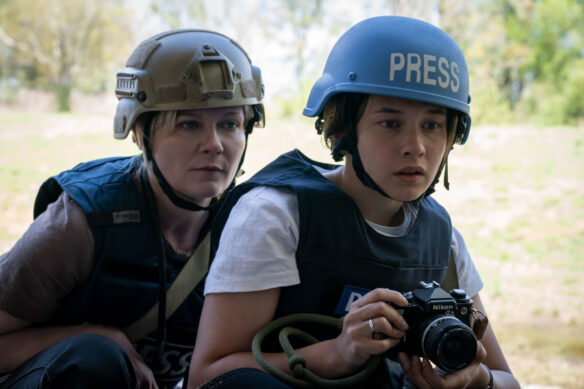
When they hear the more direct route south through Philadelphia has been compromised (read: destroyed) the quartet decides to take a more circuitous route through Pennsylvania, West Virginia and Maryland.
Along the way, they chronicle, and experience first-hand, the effects of the conflict; looters being strung up, random free fire zones and ambushes, refugee camps and most strangely, an entire town that has decided, by consensus, to “stay out of it.”
Throughout their arduous journey, they must confront their inner demons, hone their survival instincts and struggle to stave off the relentless feelings of dread, fear and post traumatic stress. And as they get closer to their ultimate goal, they begin to question whether their profession, under these dire circumstances, is actually worth doing at all.
One of the main criticisms leveled at Civil War, by critics, reviewers and the public, is that the political situation which caused the war are not specified and it’s hard to pin down who the good guys and the bad guys are.
Alex Garland is one of the rare filmmakers who dares to challenge the audience by not making it easy for you to exactly figure out what’s going on; he’s using the ambiguity of the actions of all of the individuals and groups involved and is leaving the final judgment about it to each individual viewer. If you look hard enough, there are clues to be found in the narrative, the biggest one being that the president is acting in a despotic manner and that he is into his third term in office. But you have to weigh that against the clearly lawless actions of the Western Forces, the militias and random vigilantes who are a major part of the narrative.
The events of Civil War clearly don’t take place in our world, but an alternative universe where the “Western Forces” of California and Texas, with the help of other state militias, could be allied in their hate of the federal government. A frightening world that is very similar to our own but with a very advanced case of divisiveness.
Garland has openly said in interviews that this story is a metaphor about democracy under attack and that he sees reporters as the heroes of this story, especially in these turbulent and contentious times. And in today’s world, a reporter’s good intentions and declarations of neutrality and fairness means nothing to the herd mentality of a lawless mob.
As Garland ably and searingly demonstrates throughout this film, once the belief in that fragile barrier holding our democracy in place is eliminated, the racists, seditionists and MAGA militia members will inevitably appear in the streets, automatic weapons in hand, ready to dispense their own personal brand of “social justice”.
And make no mistake, the most chilling part of Civil War is that the conflict won’t be regional, the chaos, fear and terror will be taking place in all fifty states and associated territories.
Civil War is a stark and ominous warning for America and its citizens. Hate speech, racial prejudice, misinformation and outright lies, generational, cultural and social differences are fueling a conflagration we may not be able to extinguish.
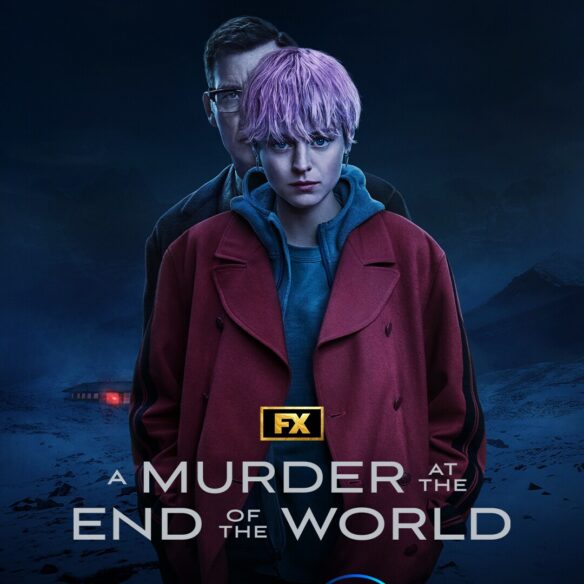
A Murder at the End of the World (**** of 4 stars, Hulu, 2023, seven episodes) with Emma Corrin, Brit Marling, Harris Dickinson, Alice Braga, Joan Che, Raúl Esparzan, Jermaine Fowler, Ryan J. Haddad, Pegah Ferydoni, Javed Khan, Louis Cancelmi, Edoardo Ballerini, Clive Owen and Kellan Tetlow as Zoomer. Created, Written and Directed by Brit Marling and Zal Batmanglij.
And while I was wading through the week’s events, Juli and I decided to take a chance on a series I wish we had seen when it premiered last November, A Murder at the End of the World.
When I initially read the premise, a band of people under a mysterious threat in Iceland, I felt as though it was just another neo-Agatha Christie/Knives Out ripoff. Oh, how wrong I was…
A mysterious billionaire, Andy Ronson (Clive Owen) and his philanthropic wife, Lee Andersen (Brit Marling) have invited an odd assortment of entrepreneurs, artists and celebrities to their hotel/retreat in a very remote part of Iceland for a symposium on the current state of the environment.
Among the guests are memoirist and amateur internet sleuth Darby Hart (Emma Corrin) and her former partner, Bill Farrah (Harris Dickinson). Neither were expecting each to see each other again so their meeting is a shocking and bittersweet surprise.
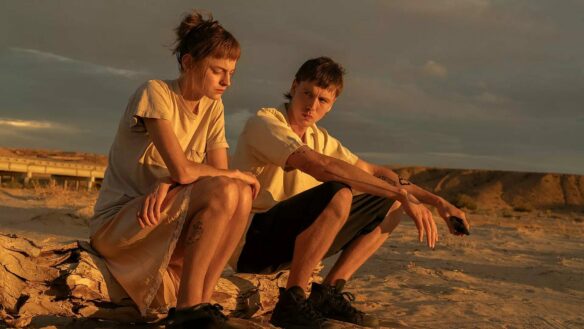
But when Bill dies soon after on that first evening, Darby is reluctantly pressed into service by Ronson to investigate before the local authorities arrive. As she does, she reminisces about how she and Bill met and why they parted ways. She also confronts the other guests, a somewhat shifty group of suspects who all may have a personal grudge against Ronson and evidence of a conspiracy whose motives and objectives are as murky as they are elusive…
The reason I lament seeing this series now is because had I seen it during its initial run, I would have been on my 2024 Hugo ballot in the Long Form category. I will not reveal the sf elements that clearly qualify this drama series because I want those elements to be a surprise to you, the viewer.
I will say this; as those elements are revealed, they do not detract or distract you from getting involved, they enhance the drama and the dire circumstances this group of characters find themselves in, from nature but mostly from the physical and emotional baggage they brought with them to this deadly retreat.
So, while it is too late to bestow any glory on A Murder at the End of the World via the Hugo Awards, it’s never too late for you to enjoy this fascinating and thrilling series on Hulu.
